Introduction
Rabbits are curious eaters, and as a pet owner, you might wonder if cucumbers are a safe treat. Yes, rabbits can eat cucumbers, but there’s more to know before adding them to your bunny’s diet.
This article will explore the benefits and risks of feeding cucumbers to your rabbit, helping you make an informed decision. Keep reading to learn how to safely introduce this refreshing snack to your furry friend!
Key Takeaways
- Cucumbers are safe for rabbits in moderation – They provide hydration and a low-calorie treat option but should not replace essential hay and leafy greens in your rabbit’s diet.
- Moderation is key – Feeding too much cucumber can lead to digestive issues, like diarrhea, due to its low fiber and high water content.
- Not a daily treat – Cucumbers should be given as an occasional snack, no more than two to three times a week, to avoid nutritional imbalances.
- Rabbits can eat cucumber peels – The peel provides extra fiber, but ensure cucumbers are washed thoroughly to remove any pesticides before feeding.
- Avoid feeding other parts of the cucumber plant – While the cucumber fruit is safe, parts like leaves, vines, and stems should be given sparingly or avoided due to potential digestive difficulties.
Can Rabbits Eat Cucumbers?
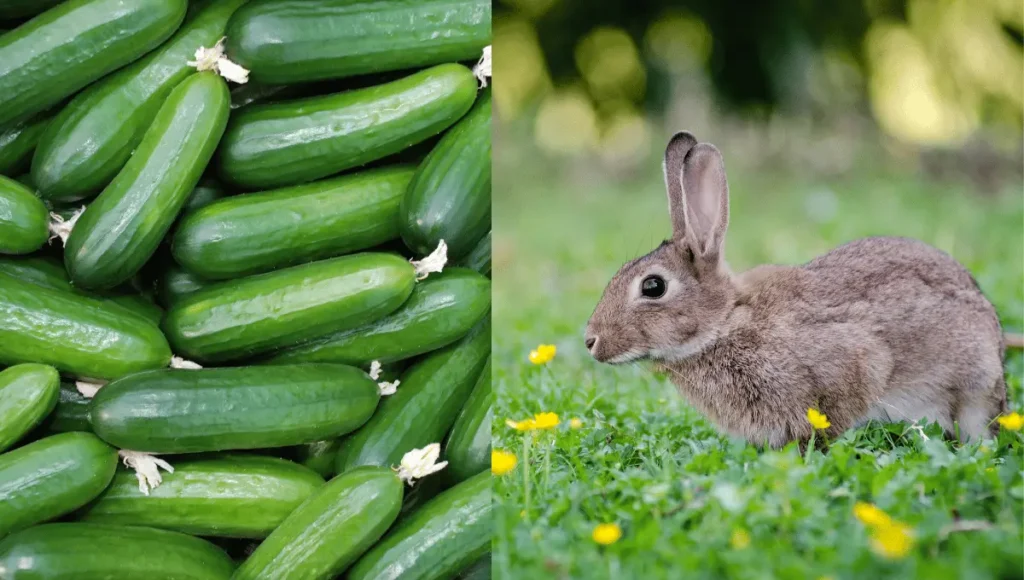
Yes, rabbits can eat cucumbers! In fact, cucumbers are a safe and refreshing treat for most rabbits. They are made up of about 95% water, which makes them a great way to help keep your bunny hydrated, especially on hot days.
Cucumbers are also low in calories, which means they won’t contribute to weight gain if given in moderation.
However, while cucumbers are safe, they should only be a small part of your rabbit’s diet. Rabbits have sensitive digestive systems that are designed to handle a diet high in fiber, like hay and leafy greens.
Cucumbers, on the other hand, are low in fiber and don’t provide all the nutrients your rabbit needs to stay healthy.
So, while cucumbers can be a tasty and hydrating treat for your rabbit, they should be given in small amounts and not as a main part of their diet.
Always introduce new foods like cucumbers gradually to make sure your rabbit’s digestive system can handle them without any issues.
Nutrition in Cucumber For Rabbits
| Nutrient | Amount per 100g | Benefit for Rabbits |
| Water | 95.23 g | Keeps rabbits hydrated, especially in hot weather. |
| Fiber | 0.5 g | Supports digestive health, but cucumbers are low in fiber. |
| Vitamin C | 2.8 mg | Antioxidant, but rabbits can synthesize their own vitamin C. |
| Vitamin K | 16.4 µg | Supports blood clotting and bone health. |
| Potassium | 147 mg | Helps with muscle function and fluid balance. |
| Magnesium | 13 mg | Supports bone health and energy production. |
| Calcium | 16 mg | Important for bone and dental health, but in moderation. |
| Phosphorus | 24 mg | Supports bone health, but balance with calcium is important. |
| Calories | 15 kcal | Low in calories, making it a light treat option. |
Benefits of Feeding Cucumbers to Rabbits
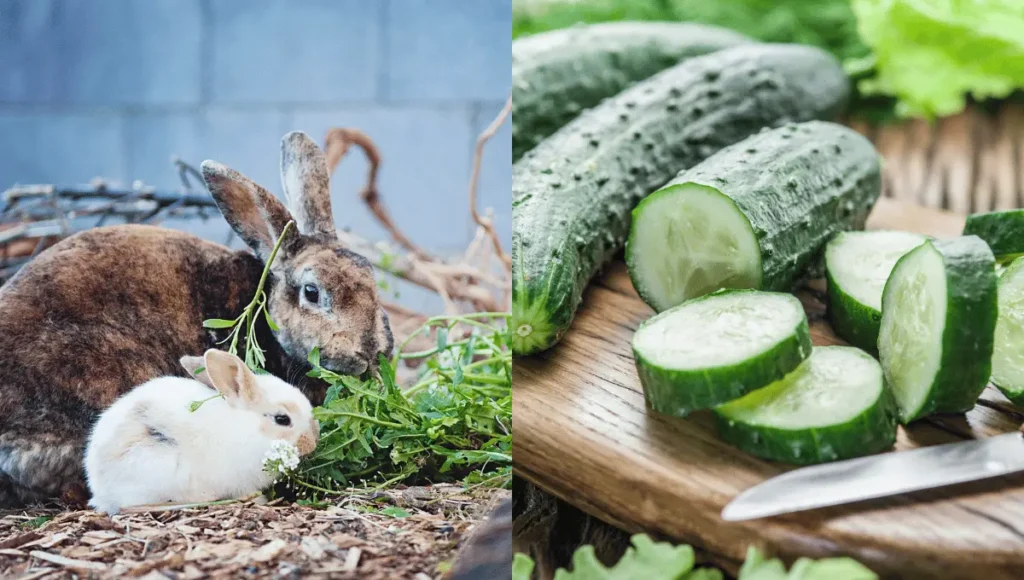

Feeding cucumbers to your rabbit can have some nice benefits, as long as they’re given in moderation. Here’s how cucumbers can be good for your furry friend:
Hydration
Cucumbers are mostly water—about 95%, to be exact. This high water content can help keep your rabbit hydrated, especially during warm weather.
Rabbits don’t always drink a lot of water, so adding a water-rich snack like cucumber can be a helpful way to ensure they’re getting enough fluids.
Low in Calories
Cucumbers are very low in calories, which makes them a good treat option if you’re worried about your rabbit gaining weight.
Unlike sugary fruits or starchy vegetables, cucumbers won’t add unnecessary calories to your rabbit’s diet. This makes them a guilt-free snack that your bunny can enjoy without you having to worry about overfeeding.
While cucumbers have these benefits, it’s important to remember that they don’t provide much in the way of nutrients that rabbits need, like fiber. So, cucumbers should be seen as a refreshing treat rather than a dietary staple. Always balance them with plenty of hay, fresh water, and other rabbit-safe vegetables.
Risks of Feeding Cucumbers to Rabbits
While cucumbers can be a safe and refreshing treat for your rabbit, there are some risks to be aware of. Here’s what you need to consider before making cucumbers a regular part of your rabbit’s diet:
Digestive Issues
Rabbits have very sensitive digestive systems that are designed to process high-fiber foods like hay and leafy greens. Cucumbers, however, are low in fiber and high in water content.
If your rabbit eats too much cucumber, it could lead to digestive issues like diarrhea or stomach upset.
This is because the lack of fiber can disrupt the balance of your rabbit’s gut, leading to loose stools or discomfort.
Potential for Overhydration
Because cucumbers are mostly water, feeding too many to your rabbit could lead to overhydration.
While it’s important for rabbits to stay hydrated, too much water can dilute the essential nutrients in their body and cause imbalances.
This could lead to issues like bloating or even more serious health problems if left unchecked.
Lack of Nutritional Value
Cucumbers don’t offer much in the way of essential nutrients for rabbits. They are low in vitamins, minerals, and fiber, which are crucial for a rabbit’s health.
If cucumbers make up too much of your rabbit’s diet, they might miss out on more nutritious foods that they really need to stay healthy.
How Much Cucumber Can We Feed to a Bunny?
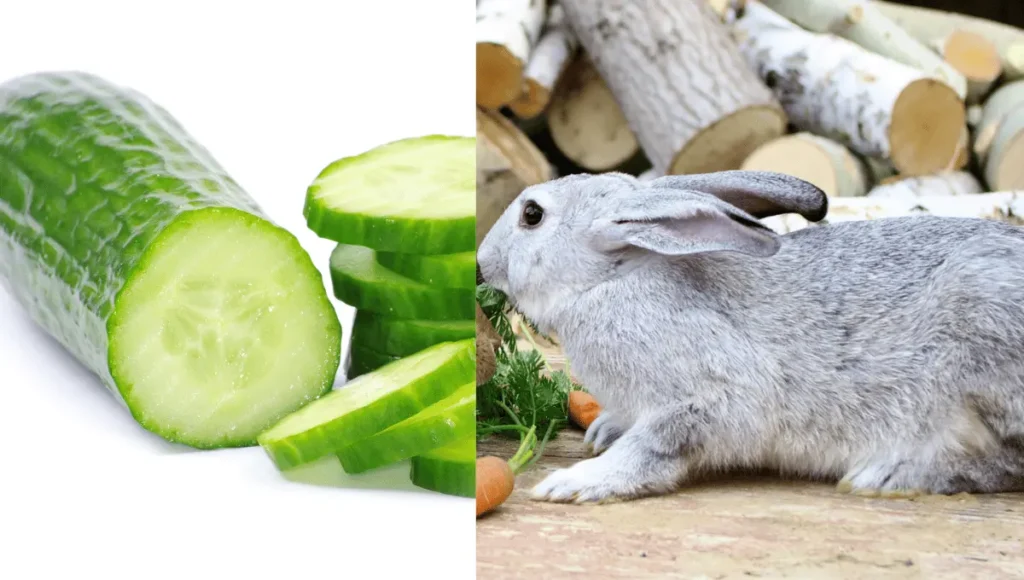

When it comes to feeding cucumbers to your rabbit, moderation is key. While cucumbers can be a healthy and refreshing treat, it’s important to limit how much you offer. Here’s a simple guide to help you determine the right amount:
Small Portions Only
Rabbits have small stomachs and sensitive digestive systems, so it’s best to give them cucumbers in small portions.
A few thin slices or small chunks of cucumber are usually enough for a single serving. Start with just a small piece to see how your rabbit reacts.
If they enjoy it and don’t have any digestive issues, you can offer a similar amount once or twice a week.
Frequency Matters
Cucumbers should be considered a treat, not a daily food item. Rabbits’ diets should be primarily composed of hay, which provides the essential fiber they need for good digestion.
Leafy greens and other vegetables can also be part of their regular diet, but cucumbers should only be given occasionally.
A good rule of thumb is to offer cucumbers no more than two to three times per week.
Consider Your Rabbit’s Size
The size of your rabbit also plays a role in how much cucumber they can safely eat. For smaller rabbits, you should reduce the portion size even further.
Larger rabbits might be able to handle a bit more, but the emphasis should still be on small, infrequent servings.
By sticking to small portions and limiting how often you give cucumbers to your rabbit, you can enjoy the benefits of this hydrating treat without putting your bunny at risk for digestive issues or nutrient imbalances.
Remember, cucumbers are just one of many treats your rabbit can enjoy, so it’s always a good idea to mix things up and offer a variety of healthy snacks.
What Can Happen If a Rabbit Eats Too Much Cucumber?
Feeding your rabbit too much cucumber can lead to a few health issues that you’ll want to avoid. While cucumbers are safe in moderation, overfeeding can cause problems due to their high water content and low nutritional value. Here’s what could happen if your rabbit eats too much cucumber:
Diarrhea
One of the most common issues with overfeeding cucumbers is diarrhea. Cucumbers are low in fiber and high in water, which can upset the delicate balance in your rabbit’s digestive system.
Without enough fiber to keep things moving smoothly, your rabbit’s stool may become loose or watery.
Diarrhea can quickly lead to dehydration and other health complications, so it’s important to monitor your rabbit’s stool after introducing cucumbers into their diet.
Nutritional Imbalance
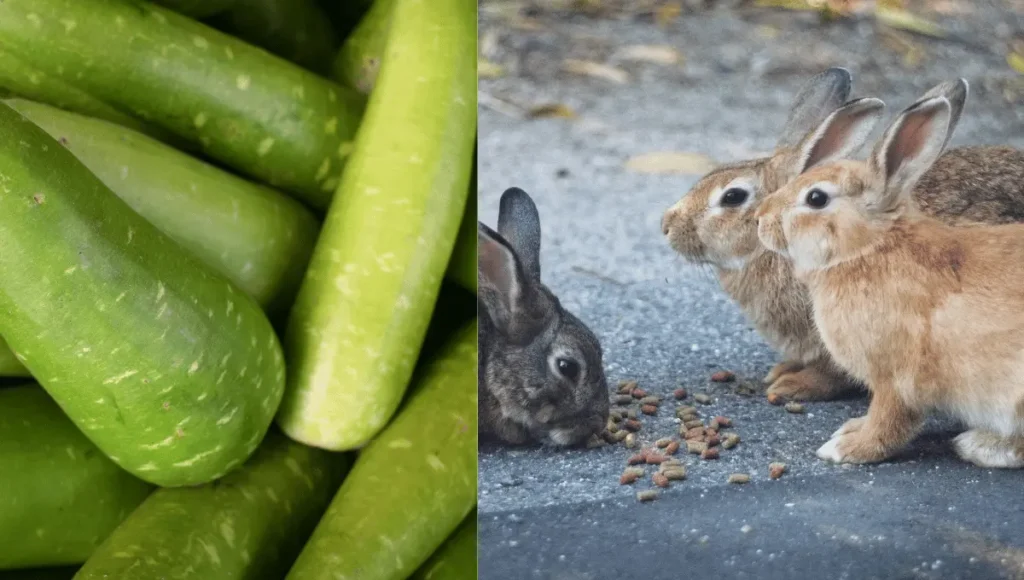

Cucumbers don’t offer much in the way of essential nutrients for rabbits. They’re mostly water, with very few vitamins or minerals that your rabbit needs.
If cucumbers make up too much of your rabbit’s diet, they might not be getting enough of the more nutritious foods that are essential for their health, like hay and leafy greens.
This can lead to a nutritional imbalance, which over time can cause weight loss, weakness, and other health issues.
Bloating and Discomfort
The high water content in cucumbers can also lead to bloating if your rabbit eats too much. Bloating can make your rabbit feel uncomfortable and may even cause pain.
In some cases, excessive bloating can be serious and require veterinary attention. Rabbits can’t vomit, so any gas or bloating needs to pass through their system, which can take time and cause distress.
Loss of Appetite for Healthier Foods
If your rabbit gets too many cucumbers, they might start to prefer them over their regular, more nutritious foods.
This can be a problem because cucumbers don’t provide the fiber, vitamins, and minerals that your rabbit needs to stay healthy.
Over time, this preference for cucumbers over hay or other vegetables can lead to malnutrition and related health issues.
To avoid these risks, it’s important to limit the amount of cucumber you give to your rabbit. Stick to small portions, and make sure cucumbers are just an occasional treat, not a regular part of their diet. By doing so, you can keep your rabbit happy and healthy without the risk of digestive problems or nutritional imbalances.
Do Rabbits Even Like Eating Cucumbers?
Rabbits can be quite picky eaters, and their tastes can vary just like ours. While some rabbits might love the cool, crisp texture of cucumbers, others might not be as enthusiastic. Here’s what you need to know about whether rabbits enjoy cucumbers:
Most Rabbits Enjoy the Taste
Many rabbits do enjoy the taste of cucumbers. The fresh, mild flavor and crunchy texture can be appealing to them, especially if they’re used to eating a variety of vegetables.
Cucumbers can be a refreshing change from the usual leafy greens, and the high water content makes them especially attractive during warmer months when your rabbit might appreciate something hydrating.
Individual Preferences
Not all rabbits are the same, and some might turn up their noses at cucumbers. If your rabbit doesn’t seem interested in cucumber, don’t be alarmed.
Rabbits have individual tastes, and what one rabbit loves, another might ignore. It’s always a good idea to offer a small piece first to see if your rabbit likes it.
If they don’t, you can try offering other rabbit-safe vegetables to see what they prefer.
Signs Your Rabbit Likes Cucumber
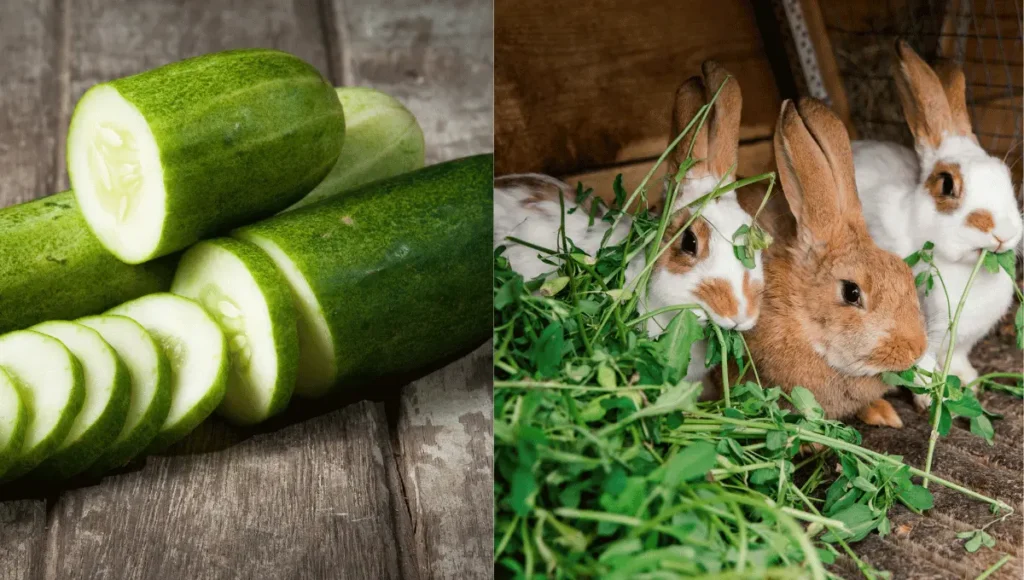

If your rabbit likes cucumber, you’ll likely notice them eagerly munching on it as soon as it’s offered. They might even get excited when they see you preparing it or come running when you bring it near.
Rabbits often show their enjoyment by nibbling quickly and coming back for more. However, even if they seem to love it, remember to keep portions small and occasional to avoid any digestive issues.
Introducing Cucumbers Gradually
If you’re offering cucumber for the first time, it’s important to introduce it gradually. Start with a small slice and watch for any signs of digestive upset, like soft stools or decreased appetite. If everything seems fine, you can continue offering cucumber as an occasional treat.
This gradual introduction helps ensure your rabbit’s digestive system can handle the new food without any problems.
Overall, while many rabbits do enjoy cucumbers, it’s all about your individual bunny’s preferences. If they like it, cucumber can be a refreshing treat in moderation. If they’re not interested, there are plenty of other healthy treats you can try that might be more to their liking.
Which Parts of Cucumbers Can a Bunny Eat?
When it comes to feeding cucumbers to your rabbit, you might wonder which parts are safe for them to eat.
While the cucumber itself is generally safe, some parts should be given with caution, and others might be best avoided altogether.
Here’s a breakdown of the different parts of a cucumber and whether they’re suitable for your bunny:
Can Rabbits Eat Cucumber Peels?
Yes, rabbits can eat cucumber peels! In fact, the peel is where most of the fiber is found, which is beneficial for your rabbit’s digestive system.
The peel also contains more nutrients than the flesh of the cucumber. However, it’s important to wash the cucumber thoroughly before giving it to your rabbit, especially if it’s not organic.
This helps remove any pesticides or chemicals that could be harmful to your bunny. If you’re concerned about pesticide residue, it’s a good idea to peel the cucumber before feeding it to your rabbit.
Can Rabbits Eat Cucumber Leaves?
Cucumber leaves are technically safe for rabbits to eat, but they should be given in very small amounts and with caution. The leaves can be a bit rough and fibrous, which might be harder for some rabbits to digest.
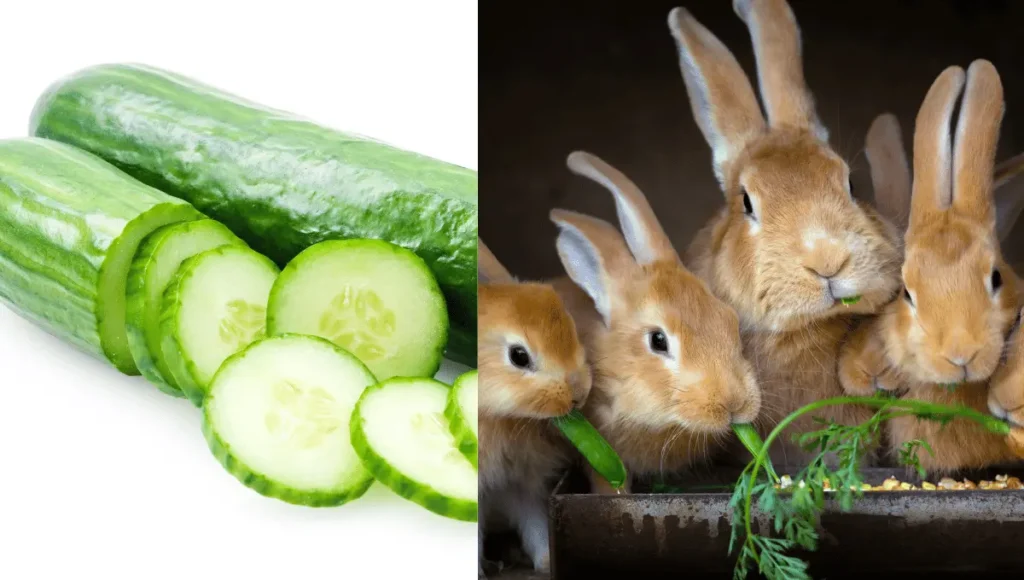

Additionally, cucumber leaves are not commonly part of a rabbit’s natural diet, so it’s best to avoid offering them regularly. If you do decide to give your rabbit cucumber leaves, make sure they are fresh, clean, and free from any pesticides.
Can Rabbits Eat Cucumber Plants?
The rest of the cucumber plant, including the vines and stems, is not recommended for rabbits. These parts are tougher and can be difficult for rabbits to chew and digest.
Additionally, the plant might contain compounds that aren’t safe for rabbits in large quantities.
To be on the safe side, it’s best to stick with the cucumber fruit itself and avoid feeding your rabbit other parts of the plant.
Can Rabbits Eat Cucumber Seeds?
Cucumber seeds are small and soft, so they’re generally safe for rabbits to eat in the small amounts that come with the cucumber flesh.
However, if the cucumber has a lot of seeds, it’s a good idea to remove some of them before offering it to your rabbit. While the seeds aren’t harmful, too many could cause digestive discomfort.
In summary, the cucumber fruit and its peel are the safest parts to feed your rabbit. The peel adds a bit of extra fiber, which can be beneficial. However, it’s important to wash the cucumber well to remove any chemicals. As for the leaves, vines, and stems, it’s best to avoid them or offer them in very small amounts and only occasionally. This way, you can ensure that your rabbit enjoys a safe and healthy treat!
Can Rabbits Eat Cucumbers Every Day?
While cucumbers are safe and can be a refreshing treat for your rabbit, it’s not a good idea to feed them cucumbers every day. Here’s why:
Lack of Essential Nutrients
Cucumbers are mostly water and low in essential nutrients like fiber, vitamins, and minerals that rabbits need to stay healthy.
A rabbit’s diet should be rich in fiber, which primarily comes from hay, to keep their digestive system functioning properly.
If you give cucumbers every day, your rabbit might fill up on them and not eat enough hay or other more nutritious foods, leading to nutritional imbalances.
Risk of Digestive Issues
Feeding cucumbers too frequently can upset your rabbit’s digestive system. Since cucumbers are low in fiber, consuming them daily could lead to issues like diarrhea or soft stools, which are signs that your rabbit isn’t getting the right balance of nutrients.
Rabbits rely on a high-fiber diet to keep their digestion smooth and regular, so too much cucumber can throw this off.
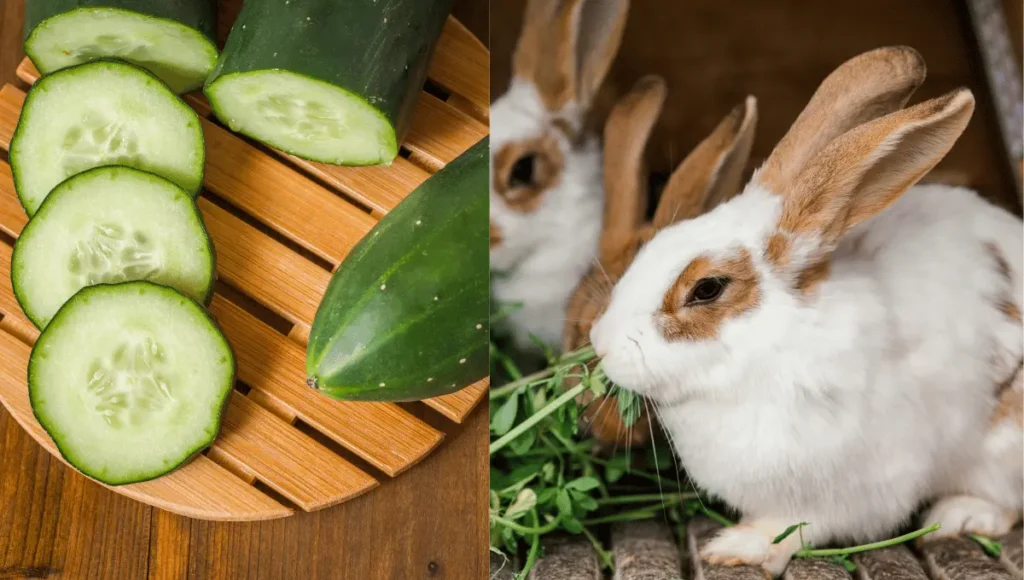

Overhydration Concerns
Cucumbers have a very high water content—about 95%. While this can help with hydration, too much water can dilute the nutrients in your rabbit’s body, potentially leading to an electrolyte imbalance.
Over time, this could cause health problems, especially if cucumbers start to replace more nutrient-dense foods in their diet.
Variety Is Key
Rabbits benefit from a varied diet that includes a mix of hay, fresh vegetables, and occasional treats.
Offering cucumbers as an occasional treat rather than a daily snack helps ensure that your rabbit gets a good range of nutrients.
It also keeps things interesting for your bunny, as they enjoy a variety of flavors and textures.
Safe Feeding Frequency
A good rule of thumb is to offer cucumbers to your rabbit no more than two to three times a week.
This allows your rabbit to enjoy the refreshing taste and hydration cucumbers provide without risking their health.
On the days when you don’t give cucumbers, you can offer other rabbit-safe vegetables like leafy greens or herbs to keep their diet balanced and nutritious.
In summary, while cucumbers can be a healthy treat for your rabbit, they shouldn’t be a daily part of their diet. By limiting cucumber intake and focusing on a diet rich in hay and other vegetables, you’ll help keep your rabbit happy, healthy, and well-nourished.
Conclusion



Cucumbers can be a safe and refreshing treat for your rabbit when offered in moderation. They provide hydration and a bit of variety to your bunny’s diet but should never replace the essential hay and leafy greens that rabbits need for good health.
By understanding the benefits, risks, and proper portions of cucumber, you can ensure your rabbit enjoys this treat safely. Remember, moderation is key, and a balanced diet is the best way to keep your rabbit happy and healthy.
FAQs
Can baby rabbits eat cucumbers?
It’s best to avoid giving cucumbers to baby rabbits. Their digestive systems are still developing, and they need a diet primarily made up of hay and mother’s milk. You can introduce cucumbers gradually when they are older, usually around 12 weeks.
Can rabbits eat cucumber seeds?
Yes, rabbits can eat cucumber seeds in small amounts. The seeds are soft and generally safe, but it’s a good idea to remove some of them if there are too many, to prevent digestive discomfort.
Should I peel cucumbers before feeding them to my rabbit?
You don’t have to peel cucumbers as the peel is safe and contains additional fiber. However, make sure to wash the cucumber thoroughly to remove any pesticides or chemicals if it’s not organic.
Can cucumbers cause bloating in rabbits?
Yes, feeding too much cucumber can cause bloating due to its high water content. This is why it’s important to offer cucumbers in moderation and as an occasional treat rather than a regular part of their diet.
What should I do if my rabbit has diarrhea after eating cucumber?
If your rabbit experiences diarrhea after eating cucumber, stop feeding it immediately and ensure they have plenty of hay and fresh water. If the diarrhea persists, consult your veterinarian to make sure there are no underlying health issues.
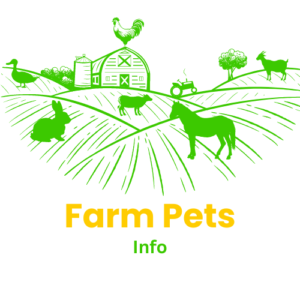
Pingback: What Can Rabbits Eat? Safe and Healthy Food Options